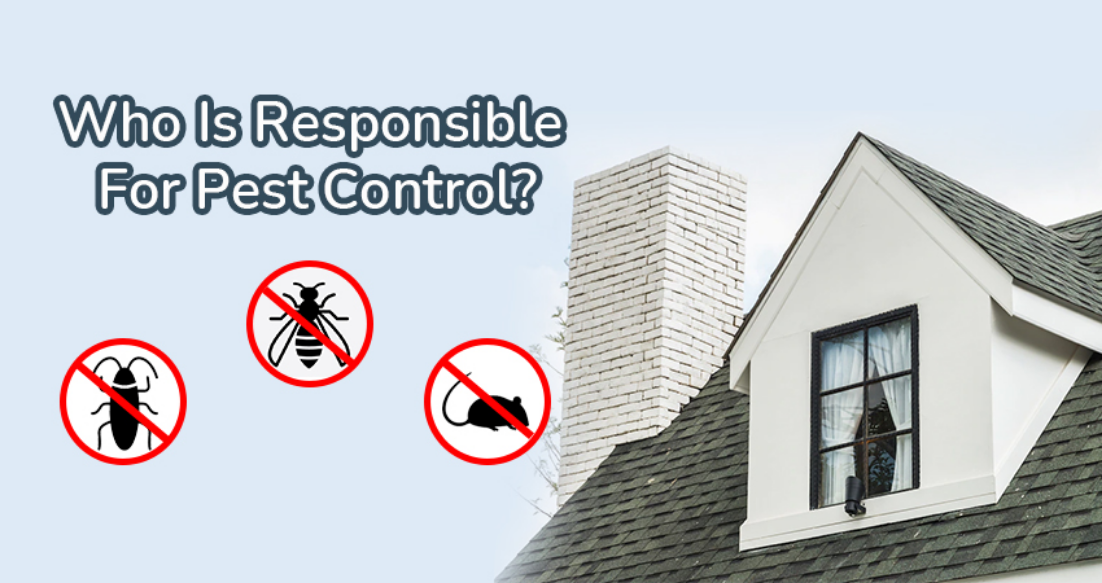Is Pest Control Landlords’ Responsibility In The USA?
Published Date: August 29, 2022

Nobody likes to get their homes infested by pests, and the issue only becomes worse when those annoying crawlies get inside your rental home. It frequently leads to misunderstandings and disputes between tenants and landlords. The question many have is, “is pest control landlords’ responsibility”?
To make sure that pests cannot enter the property is part of the landlord’s duty, but tenants also share some of that burden. We will discuss who is responsible, what the state laws are, and other concerns in this blog. Keep reading!
Steps A Tenant Needs To Follow When Pests Occur
Here’s what, as a tenant you need to do when pests occur:
- Inform the landlord of the issue right-away, and request a pest treatment immediately.
- For information on managing insect infestations, read the lease agreement. Some leases mention that tenants are responsible after moving in, while others state that the landlord is always in charge.
- Remove any debris, or dirt, from locations that might be causing the issue.
- Check the local and state laws on insect control. You can find the related information on government websites.
- If the landlord doesn’t arrange pest control services to eradicate the bugs, you can take action. Keep reading to know more about your laws as a tenant.
What Are Tenants Laws In The Pest Issue
Each state has its laws governing what constitutes appropriate living spaces and conditions in rental properties.

The laws also state what falls under a landlord’s responsibilities in the event of a pest infestation. However, as per generic guidelines, a tenant has the following options to try.
- If the signed lease specifies that the tenant is responsible for pest management, it may be time to break the agreement. However, if the landlord hasn’t upheld their end of responsibilities, the tenant may leave without facing any financial or legal repercussions.
- When major issues are not promptly resolved, tenants in several states have the right to withhold rent. However, legalities may be involved so the tenant must acquire full knowledge of the process first.
- Until the issue is resolved, tenants might be able to relocate into temporary housing and deduct the expense from their upcoming rent payment. And again, the regulations governing this will be determined by the conditions of the rental agreement and the state laws.
- Tenants have the right to file a complaint with the health department depending on the local laws.
- Filing a lawsuit can be a last resort, cases can be time and money-consuming. However, if the pest issue has affected more than one renter, it is worthwhile to consult a lawyer.
One solution doesn’t fit everyone, so be careful to understand the rules and restrictions that apply in your state.
Note: You may ask for an addendum rental agreement from your landlord that may contain any additional legal information regarding pests.
When Is The Landlord Responsible As Per The Law?

The brief breakdown of when the landlord is in charge in the event of an infestation is provided below. However, there may be changes in the duties based on the specific circumstances, the history of the building, and the state laws. Look at the table below for better understanding:
|
Pests |
Landlord is responsible if |
|
Mice and rats |
They are present prior to the tenancy |
|
Cockroaches, fleas and spiders |
They are present from the beginning of the tenancy |
|
Ants |
They are present in a wall cavity or from the start of the tenancy |
|
Termites |
They are present prior to or throughout the tenancy |
|
Wasps and Bees |
They are present in the property prior to the tenancy – wall cracks, cavity, or similar. |
|
Snakes |
They were brought on by the landlord violating the terms of the lease, such as when the landlord placed trash piles in the garden. |
Additional landlord responsibilities for pest control include:
- Property management; maintain adherence to the building code and criteria for habitability standards,
- Identify any entry points of the pests and fix them, and
- Quickly react to the complaint letters.
How Should A Landlord Add Pest Control In Lease?
Local rules and your tenancy agreement will determine who is in charge of pest treatment. For instance, in California, the landlord is responsible for pest control and maintaining the property.
In Florida, the law legally defines the elimination of bedbugs, ants, wood-destroying organisms, rats, mice, and roaches as duties of the landlord. They may reduce the rent but are not responsible for any damages in the event of an infestation.
Similarly, in Maryland, before renting out or leasing a property, landlords must make sure the area is clear of pests. The landlord is in charge of getting rid of any rodents, insects, or other pests on any properties with two or more rentals. However, the landlord is not responsible for the pest control when a tenant fails to take precautions to prevent an infestation.
Pennsylvania law says that, when a tenant rents a house, it needs to be a decent place to live. This comes under the right to a safe & sanitary home. The state supreme court called it the implied warranty of habitability.
So as per your state law, any requirements of either party must be specified in writing in the lease to reduce the likelihood of disagreements. Check out the examples below to get started:
“The landlord is in charge of controlling rodents and termites. The landlord is not allowed to offer pest control services otherwise. The tenant will be held responsible for any subsequent roach infestation. After the first six months of the lease, a pest control expert will be sent to the property; if a problem is identified, the renters will be responsible for the cost of the treatments.”
“During the length of this rental agreement, the landlord shall maintain the premises free from termite, rodent, and other pest infestation and shall pay for all necessary repairs to the property.”
Steps A Landlord Is Required To Take When Pest Issue Is Reported
When a renter complains about a pest issue, there are a few simple measures to follow.
- Inspect the property to find out the damage caused due to pest infestation.
- Look over your lease contract since such an agreement should always specify who is responsible for controlling pests. Typically, landlords are required to include a section about pest control in their rental agreements. You can refer to the above section where we have added examples of lease agreements when making one for yourself.
- If the reported pest or bug infestation issue is mentioned in your lease agreement, get the work started. Arrange a pest service and send a notice to your tenants, informing them about the date, time, or any additional notes on the pest control.
- If the situation is otherwise, document the cause of the pest infestation. Take photos of any environments that may be causing pest problems. If you can prove that the problem is caused by tenants’ lack of maintenance, you can make them pay for the pest control.
Top 3 Maintenance Tips For Landlords To Avoid Pests
As a landlord, you are in charge of various parts of the pest prevention procedure. Let’s take a look at some basics that need to be on your checklist.

Opt For Seasonal Pest Prevention
A wise landlord won’t typically leave seasonal pest treatment up to the renters. In the big picture, the property is still yours even though the tenant has the legal rights to occupy it. By performing monthly, bi-monthly, or quarterly pest prevention treatments, you can safeguard your investment.
Various pest control companies provide the best in-market solutions you can look out for and choose one for your property.
Conduct Routine Inspections
Make sure you do in-depth inspections every year and in between. If pests are a frequent issue in your region, you might even have to opt for professional pest control checks.
Educate Your Tenants
Provide your tenants with information on preventative pest control. Ask them not to leave food waste laying around and request that they pay attention to the cleanliness of the apartment. You can educate your tenants regarding apartment laws as well so that they maintain the decorum.
Our Top 3 Picks For Landlords
To help you choose a best suited pest control company, here is an analysis of three industry giants. Take a look:
|
Company
|
Cost (Annual)
|
Pests Covered
|
Environmentally Friendly
|
24/7 Availability
|
Get A Free Quote
|
Read Full Review
|
| Orkin | $575 | All common household pests | Yes | Yes | Read Review | |
| Terminix | $550 - $700 | All common household pests | Yes | Yes | Read Review | |
| Aptive Environmental | $480 - $620 | All common pests except termites and bed bugs. | Yes | Yes | Read Review |
Final Words
Be it a landlord or renters, pest infestation is an equal headache. Nobody wants to experience pest infestation problems while renting a house. So, we advise landlords or property managers to protect their investment with a yearly pest inspection and a monthly pest treatment service. Similarly, tenants are required to understand the related terms before renting out the property.
Frequently Asked Questions (FAQs)
How Long Does It Take For The Landlord To Fix The Rodent Problem?
Typically, 21-30 days are considered as an acceptable period for the landlord to fix the rodent issue in a residential rental home. However, severe rodent infestations are required to be eradicated within a couple of days.
Who Pays For The Pest Control: Landlord Or Tenant?
Mostly, landlords are responsible to pay for pest control. The only exception is if the tenant’s poor housekeeping leads to the pests.
How Much Does Pest Control Cost The Landlord?
The total amount of a pest control treatment would vary depending on the treatment you require. However, the cost of an annual treatment can be anywhere between $300 to $700.
Can Tenants Break Their Lease Agreement Because Of Pest Problems?
It depends on the laws of the specific state you’re residing in. For example, in California, you can break the lease if you’re struggling with pest infestation. But, in Arizona, you’re required to provide notice first and an opportunity to fix the problem before breaking the lease.
Do Landlords Have To Hire Licensed Professionals, Or Are There DIY Options?
There are various DIY options available that landlords can perform including chemical sprays or bug bombs. However, it is always advisable to hire licensed professionals or exterminators since their expertise and professionalism can help you better cure the pest problem.
Who Is Responsible For Pest Control In A Commercial Rental Property?
Tenants in commercial rental property are in charge of pest management by taking appropriate precautions to avoid a pest infestation, they should make sure to maintain the property as a place where people can live. The rules can differ for each state, so check your lease before purchasing the property.




